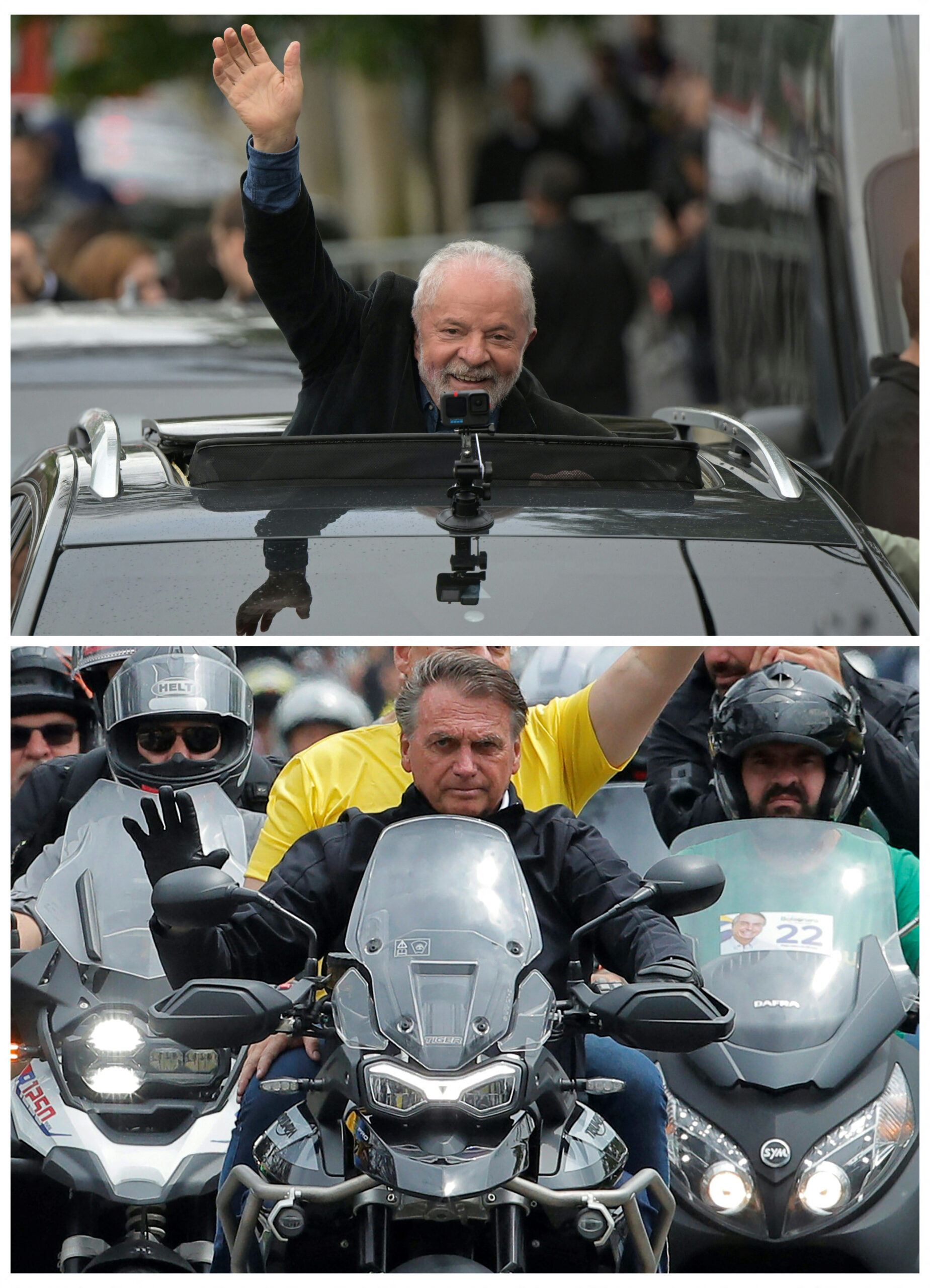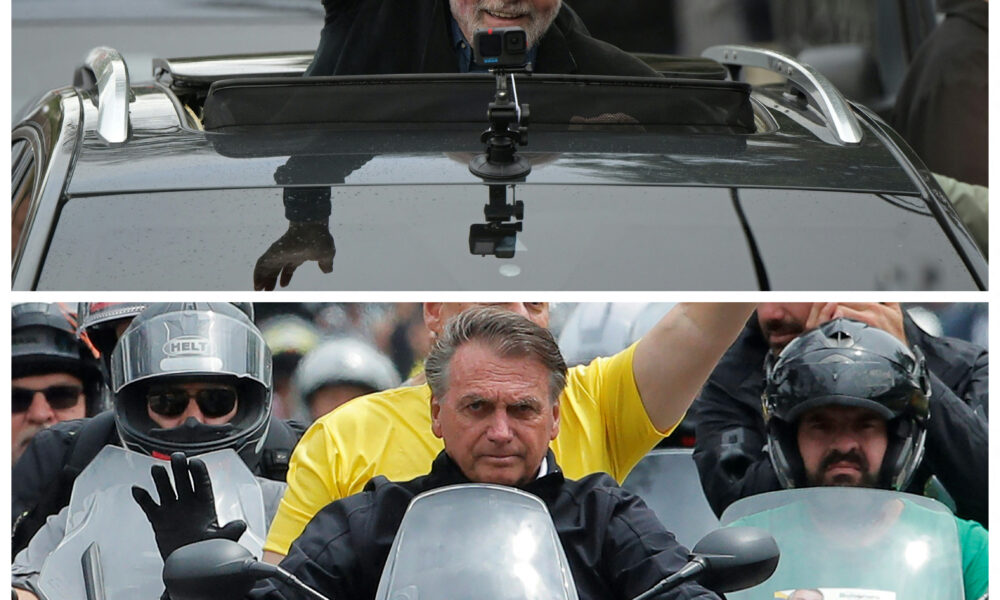International
Age, health on the ballot in Brazil’s Bolsonaro-Lula runoff

AFP | Pascale Trouillaud
One is a 67-year-old who has been in and out of hospital over the past four years for gastric problems. The other is a 76-year-old ex-smoker and cancer survivor.
But both far-right incumbent Jair Bolsonaro and leftist rival Luiz Inacio Lula da Silva are bending over backwards to project an image of youthful energy as the grueling campaign for Brazil’s October 30 presidential runoff election enters the home stretch.
Battling for every last vote, the current and former presidents both face scrutiny over their age and health.
The issue has gained prominence in a relatively young country — median age: 32.8 — where many voters are frustrated over the lack of new options, given that the clash pits the man who has led Brazil for the past four years against the one who led it for eight in the 2000s.
A scroll through the candidates’ social media accounts betrays their campaigns’ concern, with numerous pictures and videos of the rivals — both grandfathers — looking vigorous as they straddle horses, a bull, jet skis and motorcycles (Bolsonaro) or hit a punching bag, lift weights, play the drums and pose in a Speedo-style swimsuit (Lula).
‘Spring chicken’
The age issue is most sensitive for Lula, who turns 77 three days before the runoff.
The veteran leftist, who served two terms from 2003 to 2010, has indicated he would not seek a fourth.
“I have four years to get everything done. Everyone knows an 81-year-old can’t possibly want to be re-elected,” he said in September.
But he has simultaneously laughed off the age issue as he runs his sixth presidential campaign.
“I’m a spring chicken compared to Joe Biden,” who was inaugurated as US president at 78, Lula quipped last year.
Lula, who smoked for five decades before quitting in 2010, was diagnosed with cancer of the larynx in 2011.
The ex-metalworker underwent chemo and radiation therapy, and doctors declared him in “complete remission” the following year.
But his gravelly voice has grown even hoarser on the campaign trail, to the point Brazilians struggle to understand him at times.
“I’m going to have to stop talking (for) a month to recover,” jokes the twice-widowed former president, who married 56-year-old Rosangela “Janja” da Silva in May.
Smelling blood, opponents have attacked.
“Lula is physically and psychologically weaker by the day,” center-left rival Ciro Gomes posted online in August ahead of the October 2 first-round vote, in which he placed fourth, behind Lula (48 percent) and Bolsonaro (43 percent).
Gomes later backtracked, deleting the post and saying he had been “very harsh.”
Bolsonaro backers have been particularly virulent online questioning the ex-president’s health.
Lula has been at pains to prove his doctor’s assessment that he has “the health of a bull,” crisscrossing the country giving fiery speeches, and hopping up and down at rallies.
“I wake up every day at 5:30 am to work out,” beams Lula, who says he started running nine kilometers a day when he was controversially jailed in 2018 on corruption charges — since overturned.
“I want to live to be 120.”
Stabbing after-effects
A decade younger, Bolsonaro has had his share of health issues, too.
The ex-army captain, who was stabbed in the abdomen at a rally during the 2018 campaign that won him the presidency, has had recurring problems ever since.
As president, he has been hospitalized multiple times for intestinal obstructions and undergone six surgeries since 2018: four stemming from the attack, one to remove a bladder stone, and a vasectomy.
When he was last rushed to the hospital, in January, his surgeon, Antonio Luiz Macedo, said the president arrived “crying in pain” and saying, “I’m going to die.”
Macedo said the problem was a shrimp the president swallowed without chewing.
During his hospitalizations, Bolsonaro maintains an active presence on social media, posting pictures of himself flashing a thumbs-up from bed or visiting with First Lady Michelle, 40, the twice-divorced president’s third wife.
His eldest son, Senator Flavio Bolsonaro, said after the last hospital stay that doctors had told his father he needed a regime of permanent dietary restrictions.
But the president has stuck to unhealthy eating habits, according to media reports.
International
Claudia Sheinbaum: Operation Against ‘El Mencho’ Was Based on Pending Arrest Warrants

Mexico’s President Claudia Sheinbaum on Wednesday rejected claims that the military operation that resulted in the death of Nemesio Oseguera Cervantes, known as “El Mencho,” leader of the Jalisco New Generation Cartel (CJNG), was carried out under pressure from the United States government.
Sheinbaum explained that the deployment of federal forces was aimed at executing outstanding arrest warrants against Oseguera Cervantes, who was considered one of the most wanted criminals in both Mexico and the United States.
“That was not the objective (to ease pressure from the United States). It is very important, and I want to repeat it. This individual had an arrest warrant, or several,” Sheinbaum said, referring to the operation conducted on February 22.
According to the president, the initial goal was to capture Oseguera Cervantes, but military forces responded after coming under attack during the intervention.
“The operation was to detain him. The problem is that they were attacked — the Secretariat of National Defense — and they responded at that moment,” she said.
The president insisted that the action was not carried out in response to external demands, although she acknowledged intelligence cooperation with the United States.
“It was not done in any way because of pressure from the United States, not at all. Of course, there was intelligence information from the United States that was used specifically,” she concluded.
International
Spain Denies Any Agreement to Cooperate with U.S. Military in Iran Operations
International
White House Says Spain Agrees to Cooperate with U.S. Military After Trump Threatens Trade Embargo

White House Press Secretary Karoline Leavitt said Wednesday that Spain has agreed “in recent hours” to cooperate with the U.S. military, following President Donald Trump’s threat to impose a trade embargo on Madrid.
Trump had warned of potential commercial measures after Spain reportedly refused to allow the Pentagon to use facilities at Spanish military bases for operations related to Iran.
“With respect to Spain, I think you heard the president’s message yesterday loud and clear, and I understand that in recent hours they have agreed to cooperate with the United States military,” Leavitt said during a press briefing.
She added that the U.S. military is currently coordinating with its counterparts in Spain. However, the president expects broader support.
“The president expects that all of Europe, all of our European allies, of course, will cooperate in this important mission — not only for the United States, but also for Europe,” Leavitt said.
Her remarks came in response to questions about Spain’s position and its role as a U.S. ally amid rising tensions surrounding operations involving Iran.
-

 International4 days ago
International4 days agoIran Reports 201 Dead, 747 Injured After U.S. and Israeli Strikes
-

 International2 days ago
International2 days agoBrazil’s Supreme Court Rejects Bolsonaro’s Bid for House Arrest
-

 International4 days ago
International4 days agoPope Leo XIV Urges End to ‘Spiral of Violence’ in Middle East
-

 International4 days ago
International4 days agoSecurity Council to Hold Emergency Meeting on Middle East Crisis
-

 Sin categoría4 days ago
Sin categoría4 days agoTrump: ‘We Think It’s True’ Amid Claims Iran’s Supreme Leader Was Killed
-

 International2 days ago
International2 days agoAnti-ICE Billboard Campaign Targets Immigration Spending in 31 U.S. Cities
-

 International2 days ago
International2 days agoSpain’s Prime Minister to Address Nation Amid Trump’s Trade Threats
-

 International2 days ago
International2 days agoTrump Warns of ‘Major Wave’ of Attacks as Iran Conflict Escalates
-

 International2 days ago
International2 days agoMexico Calls for Immediate Probe After National Dies in ICE Custody
-

 International2 days ago
International2 days agoBolivia Orders Three Investigations Into Deadly Military Plane Crash
-

 International2 days ago
International2 days agoNew York Announces First 2,000 Seats in Universal 2-K Program
-

 Central America2 days ago
Central America2 days agoPanama Canal Monitoring Trade as Middle East Conflict Disrupts Shipping
-

 International11 hours ago
International11 hours agoWhite House Says Spain Agrees to Cooperate with U.S. Military After Trump Threatens Trade Embargo
-

 International11 hours ago
International11 hours agoSpain Denies Any Agreement to Cooperate with U.S. Military in Iran Operations
-

 Central America2 days ago
Central America2 days agoGuatemala’s Attorney General Fails in Bid for Top Court Seat Amid Corruption Allegations
-

 International2 days ago
International2 days agoWarner Bros. Developing First ‘Game of Thrones’ Movie With ‘Andor’ Writer
-

 Central America11 hours ago
Central America11 hours agoNicaragua Held Responsible for Harassment of Opposition Prosecutor and His Family
-

 International11 hours ago
International11 hours agoClaudia Sheinbaum: Operation Against ‘El Mencho’ Was Based on Pending Arrest Warrants































